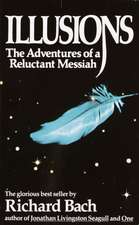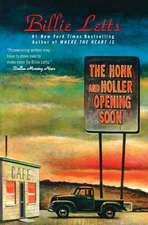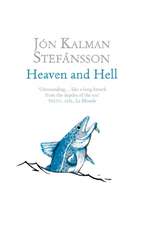Iceland's Bell: Vintage International Original
Autor Halldor Kiljan Laxness, Halldor Traducere de Philip Roughtonen Limba Engleză Paperback – 30 sep 2003
In the years that follow, the hapless but resilient rogue Hreggvidsson becomes a pawn entangled in political and personal conflicts playing out on a far grander scale. Chief among these is the star-crossed love affair between Snaefridur, known as “Iceland’s Sun,” a beautiful, headstrong young noblewoman, and Arnas Arnaeus, the king’s antiquarian, an aristocrat whose worldly manner conceals a fierce devotion to his downtrodden countrymen. As their personal struggle plays itself out on an international stage, Iceland’s Bell creates a Dickensian canvas of heroism and venality, violence and tragedy, charged with narrative enchantment on every page.
Preț: 95.51 lei
Nou
Puncte Express: 143
Preț estimativ în valută:
18.28€ • 19.03$ • 15.45£
18.28€ • 19.03$ • 15.45£
Carte disponibilă
Livrare economică 17 februarie-03 martie
Preluare comenzi: 021 569.72.76
Specificații
ISBN-13: 9781400034253
ISBN-10: 1400034256
Pagini: 448
Dimensiuni: 135 x 212 x 24 mm
Greutate: 0.33 kg
Editura: Vintage Publishing
Seria Vintage International Original
ISBN-10: 1400034256
Pagini: 448
Dimensiuni: 135 x 212 x 24 mm
Greutate: 0.33 kg
Editura: Vintage Publishing
Seria Vintage International Original
Notă biografică
Halldór Laxness was born near Reykjavik, Iceland, in 1902. His first novel was published when he was seventeen. The undisputed master of contemporary Icelandic fiction, and one of the outstanding novelists of the century, he has written more than 60 books, including novels, short stories, essays, poems, plays, and memoirs. In 1955 he was awarded the Nobel Prize for Literature. He died in 1998.
Extras
Iceland's Bell
- 1 -
There was a time, it says in books, that the Icelandic people had only one national treasure: a bell. The bell hung fastened to the ridgepole at the gable end of the courthouse at Pingvellir by Öxará. It was rung for court hearings and before executions, and was so ancient that no one knew its true age any longer. The bell had been cracked for many years before this story begins, and the oldest folk thought they could remember it as having a clearer chime. All the same, the old folk still cherished it. On calm midsummer days at iingvellir, when the fragrance of Bláskógar wafts in on gentle breezes from Súlur, the regent, the magistrate, and the executioner, the man to be hanged and the woman to be drowned assembled at the courthouse, and the chime of the bell could often be heard mingled with the murmur of Öxará.*
One year when the king decreed that the people of Iceland were to relinquish all of their brass and copper so that Copenhagen could be rebuilt following the war, men were sent to fetch the ancient bell at iingvellir by Öxará.
A few days after the dissolution of the Aljingi, two men with several packhorses approach from the western side of the lake. They ride down the ravine opposite the estuary, cross over the ford, and dismount at the edge of the lava field near the courthouse. One of the men is pale, with full cheeks and small eyes, wearing a tattered aristocrat's jacket much too small for his frame and walking with his elbows extended like a child pretending to be a nobleman. The other is dark, ragged, and ugly.
An old man with a dog walks over through the lava rocks and steps out onto the path before the travelers.
"And who might you men be?"
The fat one answers: "I am His Majesty's emissary and hangman."
"You don't say," the old man mumbled hoarsely, in a voice that seemed to come from a great distance. "All the same, it's the Creator who rules."
"I have a letter to prove it," said the king's emissary.
"Oh, for sure," said the old man. "Everyone's got letters these days. All sorts of letters."
"Are you calling me a liar, you old devil?" asked the king's emissary.
The old man didn't want to risk coming any closer to the travelers, so he sat down on the remains of the wall encircling the courthouse and looked at them. He was no different from any other old man: he had a gray beard, red eyes, a chimney-cap, and gnarled legs, and he clenched his blue hands around his walking stick and leaned forward upon it tremblingly. His dog came over inside the wall and sniffed at the men without barking, as dogs do when concealing their savagery.
"No one had letters in the old days," murmured the old man softly.
Swarthy, the pale man's guide, exclaimed: "Right you are, pal! Gunnar of Hlíbarendi* had no letters."
"And who are you?" asked the old man.
"Oh, this is a cord-thief from Akranes; he's been lying about in the irælakista at Bessastabir* since Easter," answered the king's emissary, and he kicked angrily at the dog.
The black-haired man spoke up and sneered, baring his gleaming white teeth: "That's the king's hangman from Bessastabir. All the dogs piss on him."
The old man on the crumbling wall said nothing, and his expression remained for the most part blank. He continued to look at them and blinked a little as he sat there trembling.
"Climb up there on the house, Jón Hreggvibsson, you miserable wretch," said the king's hangman, "and cut down the bell. I find it hilarious to think that on the day when my Most Gracious Sire orders me to twist the noose around your neck, right here in this very place, no one will be ringing this bell."
"Enough with your mockery, lads," said the old man. "It's an old bell."
"If you're in league with the priest," said the king's hangman, "then tell him from me that neither quibbling nor crying is of use here. We have letters for eighteen bells plus one-this one. We've been ordered to break them apart and send the pieces to Denmark on the Hólmship.* I answer to none but the king."
He took a pinch from his snuff-horn without offering any to his companion.
"God bless the king," said the old man. "All those church bells that the pope used to own, the king owns now. But this is not a church bell. It's the bell of the land. I was born here on Bláskógaheibi."
"Do you have any tobacco?" asked the black-haired man. "This damned hangman's too stingy to give a man some snuff."
"No," said the old man. "My people have never had any tobacco. It's been a hard year. My two grandchildren died in the spring. I'm an old man now. This bell-it has always belonged to this country."
"Who has the letters to prove it?" asked the hangman.
"My father was born here on Bláskógaheibi," said the old man.
"No one owns anything unless he has letters for it," said the king's hangman.
"I believe that it says in the old books," said the old man, "that when the Norwegians arrived in this empty land, they found this bell in a cave by the sea, along with a cross that's now lost."
"My letter is from the king, I say!" said the hangman. "And get yourself on up to the roof, Jón Hreggvibsson, you black thief!"
"The bell may not be broken," said the old man, who had stood up. "It may not be taken away in the Hólmship. It has been rung at the Aljingi by Öxará since the beginning-long before the days of the king; some say before the days of the pope."
"I could care less," said the king's hangman. "Copenhagen must be rebuilt. We've been fighting a war against the Swedes and those filthy bastard skulkers have bombarded the place."
"My grandfather lived at Fíflavellir,* some way up from here on Bláskógaheibi," said the old man, as if he were starting to narrate a long story. But he got no further.
"Ne'er would king with arms so stout caress her
Drape her in gems that fair bewitch
Drape her in gems that fair bewitch . . ."
The black thief Jón Hreggvibsson was straddling the roof, his feet dangling out over the gable, singing the Elder Ballad of Pontus.* The bell was fastened with a thick rope around the ridgepole, and he hacked at the rope with an ax until the bell fell down into the dooryard:
"Drape her in gems that fair bewitch
-Unless she were both young and r-i-i-i-ch . . .
. . . and now they say that my Most Gracious Hereditary Sire has gotten himself a third mistress," he shouted down from the roof, as if announcing tidings to the old man. He looked at the edge of the ax and added: "And she's supposed to be the fattest of them all. That's what separates the king from me and Siggi Snorrason."
The old man made no reply.
"Your words are going to cost you, Jón Hreggvibsson," said the hangman.
"Gunnar of Hlíbarendi would never have run away from a pale pig-belly from Álftanes," said Jón Hreggvibsson.
The pale emissary took a sledgehammer from a saddlebag, placed the ancient bell of Iceland on the doorstep before the courthouse, raised the hammer up high, and gave the bell a blow, but it only slipped a bit from under the hammer with a dull and glancing sound. Jón Hreggvibsson called down from the roof:
"'Seldom break bones on hollow ground, my man,' said Axlar-Björn."*
The king's hangman repositioned the bell against the step and struck its inner edge, and this time the bell broke in two along its crack. The old man had sat down again upon the crumbling wall. He looked tremblingly into the distance, his sinewy hands clenched around his stick.
The hangman took another pinch of snuff. The soles of Jón Hreggvibsson's feet could be seen dangling from the roof.
"Are you planning on riding the house all day?" shouted the hangman to the thief.
Up on the roof of the courthouse, Jón Hreggvibsson sang:
"Ne'er would I with arms so stout embrace her
Though her gleam might fair bewitch
Though her gleam might fair bewitch
Unless she were both fat and ri-i-ich."
They put the pieces of the broken bell in a bag, which they hung on a saddle-peg opposite the sledgehammer and the ax. Then they mounted. The dark man led the horses by the reins. The pale man rode freely alongside the packtrain, following genteel custom.
"Farewell, you old Bláskógar devil," he said. "And give God's greeting and mine to the iingvellir priest and tell him that His Royal Majesty's emissary and hangman Sigurbur Snorrason has been here."
Jón Hreggvibsson sang:
"The kingdom's lord leads ladies and pages parading
Throughout his lands at furious pace
Throughout his lands at furious pace
Throughout his lands at furious pace
-On champing stallions they boldly ra-a-ace."
The packtrain left by the same route as it had come: over the ford at Öxará, up the slope of the ravine opposite the estuary, then southward to Mossfellsheibi, following the path to the west of the lake.
- 2 -
Actually, nothing more than usual had been proven against Jón Hreggvibsson, even though he had, as always, been charged with the crime. In general, everyone able to do so tried to steal anything they could from the drying sheds of the fishermen on Skagi* during cruel springtimes; some stole fish, some cord for fishing lines. Every spring was cruel. But the regent in Bessastabir always needed more workers and he was delighted when bailiffs sent thieves to his workhouse, known as the irælakista-suspected thieves were just as welcome there as proven ones. At the beginning of the haymaking season, however, the authorities in Borgarfjörbur sent word to the regent that the rogue Jón Hreggvibsson should be sent home to Rein on Akranes, because his people had no provider and were close to starvation.
The farm stood at the foot of the mountain in the place where it was most in danger from both landslides and avalanches. Christ owned the farm and its six-cow inventory.* A long time ago one of the bishops of Skálholt* had donated the farm to this particular landlord with the proviso that it be used to subsidize a widow in the parish of Akranes, particularly one who was pious, honest, and burdened with children; if no widow of this sort could be found in Akranes, one should be sought in Skorradalur. A long search was conducted but no such widow was found in either district, so Jón Hreggvibsson had been made the tenant of the farmer Jesus.
His homecoming was as might be expected considering the dwellers there were either lepers or half-wits, if not both. Jón Hreggvibsson was drunk when he came home and he began immediately to beat his wife and his idiot son. His fourteen-year-old daughter laughed at him and his aged mother embraced him tearfully: these he did not beat to any considerable extent. His sister and aunt, who were both lepers, one glabrous and palsied, the other nodous and ulcerous, sat downcast in their black veils out by the dungheap, holding each other's hands and praising God.
Next morning the farmer went out to sharpen his scythe, and afterward began to cut the grass, loudly singing the Ballad of Pontus. The black veils moved reluctantly to the edge of the homefield and started pottering about with rakes. The half-wit and the dog sat on a hillock. The daughter came and stood before the door, barefoot and in a torn undershirt, to take in the smell of the newly mown grass, black and white and slender. Smoke reeked from the chimney.
Several days passed.
It then happened that a fine-looking courier riding a strong horse showed up at Rein and delivered to Jón Hreggvibsson a message that he was to appear in the bailiff's court at Skagi after a week's time. Jón saddled his jade on the appointed day and rode out to Skagi. The hangman Sigurbur Snorrason was there. They were given soured whey to drink. Court was convened in the bailiff's sitting room and Jón Hreggvibsson was accused of having, at iingvellir by Öxará, slandered our Supreme Highness and Majesty, Count in Holstein, our Most Gracious Hereditary King and Sire, with unseemly gibes to the effect that this our Sire had now adulterously acquired three mistresses. Jón Hreggvibsson denied having said any such thing about his Beloved Hereditary King and Most Gracious Sire, His Highness and Majesty and Count in Holstein, and asked for witnesses. Sigurbur Snorrason swore that these were Jón Hreggvibsson's words. Jón Hreggvibsson requested that he be allowed to forswear the accusation, but counteroaths were not allowed at the same hearing. After the farmer's request was rejected, he said that it was as a matter of fact true that he'd spoken the words-everyone in the irælakista at Bessastabir was talking about it-but it was out of the question that he'd intended to insult his king with these words. Quite the contrary-he'd simply wanted to say how much he admired a king who was so excellent that he was able to have three mistresses at once, in addition to a queen; at the same time he'd been poking fun at his good friend Sigurbur Snorrason, who'd never made the acquaintance of a woman as far as anyone knew. But even if he had spoken these words about his Most Gracious Hereditary Sire himself, he was sure that His Highness was so benevolent that he would willingly forgive one poor, stupid man and muddleheaded beggar of such ill-advised chatter. Court was then adjourned and the sentence handed down that Jón Hreggvibsson was to pay three rixdollars* to the king within a month, or his skin would be taken in place of the fee. The court's verdict was worded along these lines: that the ruling "was determined not so much according to a large amount of testimony, but rather according to the sufficient amount of evidence that was implicit in the testimony." With that, Jón Hreggvibsson rode home. Little else of interest occurred during haymaking, and the farmer gave hardly any thought to paying his fine to the king.
In the fall an assembly was convened in Kjalardalur. Jón Hreggvibsson was summoned to the assembly and two farmers were sent by the bailiff to escort him there. The farmer's mother mended his shoes before he left. The Rein farmer's mare had a limp and they made the journey slowly, arriving in Kjalardalur late in the day, toward the end of the assembly. It turned out that Jón Hreggvibsson was to be flogged with twenty-four lash-strokes. Sigurbur Snorrason had arrived on the scene with his leather straps and his hangman's cloak. Many of the farmers had ridden home from the assembly, but a number of youngsters from the nearest farms had come to watch the flogging for fun. Floggings were carried out in a pen where the ewes were milked during the summer; the pen had a stone crib running through it, and the scoundrel was laid across this crib while justice was being done. The more important men stood in the meantime in the corners of the pen on either side of the crib, while children, dogs, and beggars stood on the walls.
- 1 -
There was a time, it says in books, that the Icelandic people had only one national treasure: a bell. The bell hung fastened to the ridgepole at the gable end of the courthouse at Pingvellir by Öxará. It was rung for court hearings and before executions, and was so ancient that no one knew its true age any longer. The bell had been cracked for many years before this story begins, and the oldest folk thought they could remember it as having a clearer chime. All the same, the old folk still cherished it. On calm midsummer days at iingvellir, when the fragrance of Bláskógar wafts in on gentle breezes from Súlur, the regent, the magistrate, and the executioner, the man to be hanged and the woman to be drowned assembled at the courthouse, and the chime of the bell could often be heard mingled with the murmur of Öxará.*
One year when the king decreed that the people of Iceland were to relinquish all of their brass and copper so that Copenhagen could be rebuilt following the war, men were sent to fetch the ancient bell at iingvellir by Öxará.
A few days after the dissolution of the Aljingi, two men with several packhorses approach from the western side of the lake. They ride down the ravine opposite the estuary, cross over the ford, and dismount at the edge of the lava field near the courthouse. One of the men is pale, with full cheeks and small eyes, wearing a tattered aristocrat's jacket much too small for his frame and walking with his elbows extended like a child pretending to be a nobleman. The other is dark, ragged, and ugly.
An old man with a dog walks over through the lava rocks and steps out onto the path before the travelers.
"And who might you men be?"
The fat one answers: "I am His Majesty's emissary and hangman."
"You don't say," the old man mumbled hoarsely, in a voice that seemed to come from a great distance. "All the same, it's the Creator who rules."
"I have a letter to prove it," said the king's emissary.
"Oh, for sure," said the old man. "Everyone's got letters these days. All sorts of letters."
"Are you calling me a liar, you old devil?" asked the king's emissary.
The old man didn't want to risk coming any closer to the travelers, so he sat down on the remains of the wall encircling the courthouse and looked at them. He was no different from any other old man: he had a gray beard, red eyes, a chimney-cap, and gnarled legs, and he clenched his blue hands around his walking stick and leaned forward upon it tremblingly. His dog came over inside the wall and sniffed at the men without barking, as dogs do when concealing their savagery.
"No one had letters in the old days," murmured the old man softly.
Swarthy, the pale man's guide, exclaimed: "Right you are, pal! Gunnar of Hlíbarendi* had no letters."
"And who are you?" asked the old man.
"Oh, this is a cord-thief from Akranes; he's been lying about in the irælakista at Bessastabir* since Easter," answered the king's emissary, and he kicked angrily at the dog.
The black-haired man spoke up and sneered, baring his gleaming white teeth: "That's the king's hangman from Bessastabir. All the dogs piss on him."
The old man on the crumbling wall said nothing, and his expression remained for the most part blank. He continued to look at them and blinked a little as he sat there trembling.
"Climb up there on the house, Jón Hreggvibsson, you miserable wretch," said the king's hangman, "and cut down the bell. I find it hilarious to think that on the day when my Most Gracious Sire orders me to twist the noose around your neck, right here in this very place, no one will be ringing this bell."
"Enough with your mockery, lads," said the old man. "It's an old bell."
"If you're in league with the priest," said the king's hangman, "then tell him from me that neither quibbling nor crying is of use here. We have letters for eighteen bells plus one-this one. We've been ordered to break them apart and send the pieces to Denmark on the Hólmship.* I answer to none but the king."
He took a pinch from his snuff-horn without offering any to his companion.
"God bless the king," said the old man. "All those church bells that the pope used to own, the king owns now. But this is not a church bell. It's the bell of the land. I was born here on Bláskógaheibi."
"Do you have any tobacco?" asked the black-haired man. "This damned hangman's too stingy to give a man some snuff."
"No," said the old man. "My people have never had any tobacco. It's been a hard year. My two grandchildren died in the spring. I'm an old man now. This bell-it has always belonged to this country."
"Who has the letters to prove it?" asked the hangman.
"My father was born here on Bláskógaheibi," said the old man.
"No one owns anything unless he has letters for it," said the king's hangman.
"I believe that it says in the old books," said the old man, "that when the Norwegians arrived in this empty land, they found this bell in a cave by the sea, along with a cross that's now lost."
"My letter is from the king, I say!" said the hangman. "And get yourself on up to the roof, Jón Hreggvibsson, you black thief!"
"The bell may not be broken," said the old man, who had stood up. "It may not be taken away in the Hólmship. It has been rung at the Aljingi by Öxará since the beginning-long before the days of the king; some say before the days of the pope."
"I could care less," said the king's hangman. "Copenhagen must be rebuilt. We've been fighting a war against the Swedes and those filthy bastard skulkers have bombarded the place."
"My grandfather lived at Fíflavellir,* some way up from here on Bláskógaheibi," said the old man, as if he were starting to narrate a long story. But he got no further.
"Ne'er would king with arms so stout caress her
Drape her in gems that fair bewitch
Drape her in gems that fair bewitch . . ."
The black thief Jón Hreggvibsson was straddling the roof, his feet dangling out over the gable, singing the Elder Ballad of Pontus.* The bell was fastened with a thick rope around the ridgepole, and he hacked at the rope with an ax until the bell fell down into the dooryard:
"Drape her in gems that fair bewitch
-Unless she were both young and r-i-i-i-ch . . .
. . . and now they say that my Most Gracious Hereditary Sire has gotten himself a third mistress," he shouted down from the roof, as if announcing tidings to the old man. He looked at the edge of the ax and added: "And she's supposed to be the fattest of them all. That's what separates the king from me and Siggi Snorrason."
The old man made no reply.
"Your words are going to cost you, Jón Hreggvibsson," said the hangman.
"Gunnar of Hlíbarendi would never have run away from a pale pig-belly from Álftanes," said Jón Hreggvibsson.
The pale emissary took a sledgehammer from a saddlebag, placed the ancient bell of Iceland on the doorstep before the courthouse, raised the hammer up high, and gave the bell a blow, but it only slipped a bit from under the hammer with a dull and glancing sound. Jón Hreggvibsson called down from the roof:
"'Seldom break bones on hollow ground, my man,' said Axlar-Björn."*
The king's hangman repositioned the bell against the step and struck its inner edge, and this time the bell broke in two along its crack. The old man had sat down again upon the crumbling wall. He looked tremblingly into the distance, his sinewy hands clenched around his stick.
The hangman took another pinch of snuff. The soles of Jón Hreggvibsson's feet could be seen dangling from the roof.
"Are you planning on riding the house all day?" shouted the hangman to the thief.
Up on the roof of the courthouse, Jón Hreggvibsson sang:
"Ne'er would I with arms so stout embrace her
Though her gleam might fair bewitch
Though her gleam might fair bewitch
Unless she were both fat and ri-i-ich."
They put the pieces of the broken bell in a bag, which they hung on a saddle-peg opposite the sledgehammer and the ax. Then they mounted. The dark man led the horses by the reins. The pale man rode freely alongside the packtrain, following genteel custom.
"Farewell, you old Bláskógar devil," he said. "And give God's greeting and mine to the iingvellir priest and tell him that His Royal Majesty's emissary and hangman Sigurbur Snorrason has been here."
Jón Hreggvibsson sang:
"The kingdom's lord leads ladies and pages parading
Throughout his lands at furious pace
Throughout his lands at furious pace
Throughout his lands at furious pace
-On champing stallions they boldly ra-a-ace."
The packtrain left by the same route as it had come: over the ford at Öxará, up the slope of the ravine opposite the estuary, then southward to Mossfellsheibi, following the path to the west of the lake.
- 2 -
Actually, nothing more than usual had been proven against Jón Hreggvibsson, even though he had, as always, been charged with the crime. In general, everyone able to do so tried to steal anything they could from the drying sheds of the fishermen on Skagi* during cruel springtimes; some stole fish, some cord for fishing lines. Every spring was cruel. But the regent in Bessastabir always needed more workers and he was delighted when bailiffs sent thieves to his workhouse, known as the irælakista-suspected thieves were just as welcome there as proven ones. At the beginning of the haymaking season, however, the authorities in Borgarfjörbur sent word to the regent that the rogue Jón Hreggvibsson should be sent home to Rein on Akranes, because his people had no provider and were close to starvation.
The farm stood at the foot of the mountain in the place where it was most in danger from both landslides and avalanches. Christ owned the farm and its six-cow inventory.* A long time ago one of the bishops of Skálholt* had donated the farm to this particular landlord with the proviso that it be used to subsidize a widow in the parish of Akranes, particularly one who was pious, honest, and burdened with children; if no widow of this sort could be found in Akranes, one should be sought in Skorradalur. A long search was conducted but no such widow was found in either district, so Jón Hreggvibsson had been made the tenant of the farmer Jesus.
His homecoming was as might be expected considering the dwellers there were either lepers or half-wits, if not both. Jón Hreggvibsson was drunk when he came home and he began immediately to beat his wife and his idiot son. His fourteen-year-old daughter laughed at him and his aged mother embraced him tearfully: these he did not beat to any considerable extent. His sister and aunt, who were both lepers, one glabrous and palsied, the other nodous and ulcerous, sat downcast in their black veils out by the dungheap, holding each other's hands and praising God.
Next morning the farmer went out to sharpen his scythe, and afterward began to cut the grass, loudly singing the Ballad of Pontus. The black veils moved reluctantly to the edge of the homefield and started pottering about with rakes. The half-wit and the dog sat on a hillock. The daughter came and stood before the door, barefoot and in a torn undershirt, to take in the smell of the newly mown grass, black and white and slender. Smoke reeked from the chimney.
Several days passed.
It then happened that a fine-looking courier riding a strong horse showed up at Rein and delivered to Jón Hreggvibsson a message that he was to appear in the bailiff's court at Skagi after a week's time. Jón saddled his jade on the appointed day and rode out to Skagi. The hangman Sigurbur Snorrason was there. They were given soured whey to drink. Court was convened in the bailiff's sitting room and Jón Hreggvibsson was accused of having, at iingvellir by Öxará, slandered our Supreme Highness and Majesty, Count in Holstein, our Most Gracious Hereditary King and Sire, with unseemly gibes to the effect that this our Sire had now adulterously acquired three mistresses. Jón Hreggvibsson denied having said any such thing about his Beloved Hereditary King and Most Gracious Sire, His Highness and Majesty and Count in Holstein, and asked for witnesses. Sigurbur Snorrason swore that these were Jón Hreggvibsson's words. Jón Hreggvibsson requested that he be allowed to forswear the accusation, but counteroaths were not allowed at the same hearing. After the farmer's request was rejected, he said that it was as a matter of fact true that he'd spoken the words-everyone in the irælakista at Bessastabir was talking about it-but it was out of the question that he'd intended to insult his king with these words. Quite the contrary-he'd simply wanted to say how much he admired a king who was so excellent that he was able to have three mistresses at once, in addition to a queen; at the same time he'd been poking fun at his good friend Sigurbur Snorrason, who'd never made the acquaintance of a woman as far as anyone knew. But even if he had spoken these words about his Most Gracious Hereditary Sire himself, he was sure that His Highness was so benevolent that he would willingly forgive one poor, stupid man and muddleheaded beggar of such ill-advised chatter. Court was then adjourned and the sentence handed down that Jón Hreggvibsson was to pay three rixdollars* to the king within a month, or his skin would be taken in place of the fee. The court's verdict was worded along these lines: that the ruling "was determined not so much according to a large amount of testimony, but rather according to the sufficient amount of evidence that was implicit in the testimony." With that, Jón Hreggvibsson rode home. Little else of interest occurred during haymaking, and the farmer gave hardly any thought to paying his fine to the king.
In the fall an assembly was convened in Kjalardalur. Jón Hreggvibsson was summoned to the assembly and two farmers were sent by the bailiff to escort him there. The farmer's mother mended his shoes before he left. The Rein farmer's mare had a limp and they made the journey slowly, arriving in Kjalardalur late in the day, toward the end of the assembly. It turned out that Jón Hreggvibsson was to be flogged with twenty-four lash-strokes. Sigurbur Snorrason had arrived on the scene with his leather straps and his hangman's cloak. Many of the farmers had ridden home from the assembly, but a number of youngsters from the nearest farms had come to watch the flogging for fun. Floggings were carried out in a pen where the ewes were milked during the summer; the pen had a stone crib running through it, and the scoundrel was laid across this crib while justice was being done. The more important men stood in the meantime in the corners of the pen on either side of the crib, while children, dogs, and beggars stood on the walls.
Recenzii
“Laxness has genuine magic as a novelist.” –New York Herald Tribune
“Laxness is a poet who writes to the edge of the pages, a visionary who allows us a plot: He takes a Tolstoyan overview, he weaves in an Evelyn Waugh-like humor; it is not possible to be unimpressed.” –Daily Telegraph
“Laxness is a poet who writes to the edge of the pages, a visionary who allows us a plot: He takes a Tolstoyan overview, he weaves in an Evelyn Waugh-like humor; it is not possible to be unimpressed.” –Daily Telegraph





















